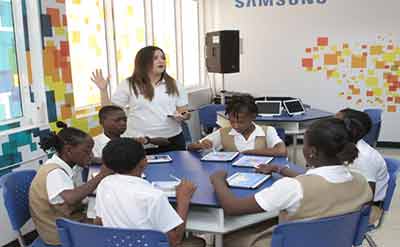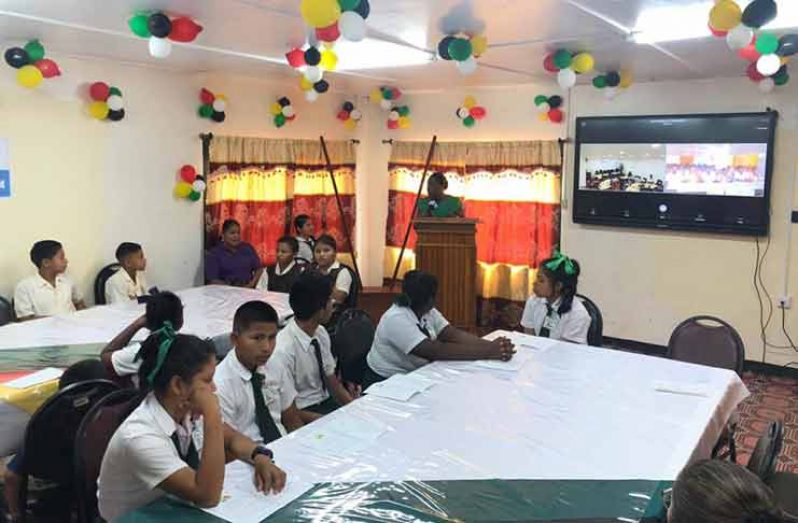— education minister
MINISTER of Education, Dr. Nicolette Henry, has shared that the integration of Information and Communication Technology (ICT) into the education system is key for bridging disparities that exist and for modernising the sector.
“As the minister, I have recognised that we have some gaps in our current education sector and it is incumbent upon me to have those gaps filled,” she told the Guyana Chronicle recently. “One of the glaring, striking and perhaps most notable gaps has to do with the fact that we do not engage – in a very large way – ICT-enabled learning.”
Cognisant of this, she indicated that a number of initiatives and mechanisms are being implemented to address those gaps.

Currently, the local curriculum is going through a process of reform. According to the minister, the current curriculum draws from what was created since in the 1970s and in this rapidly-changing world, reform is overdue – particularly in integrating ICT.
“This (ICT) is something that is new, this is something different and it provides an opportunity that we’re leveraging, so that as we are doing curriculum reform, we are modernising in a large way,” she said.
In recent times, the ministry began introducing “Smart Classrooms.” The Smart Classroom Solution is a complete digital education package consisting of Samsung tablets, televisions, a server and related software.
Through this, teachers and students can engage in interactive learning which combines various elements (such as multimedia components: videos, audio and photographs) with communication technologies, that create a learning space that transcends geographic location.

Smart classrooms have been introduced in various locations across Guyana, and according to the minister, it is the ministry’s vision to have these in all secondary schools in Guyana
“What we want is to give students a learning, real-time opportunity to benefit from classes happening at any part of the country,” she said.
Due to the disparities that manifest in sectors of the education sector, particularly due to geographic challenges, these smart classrooms are expected to transcend those.
In February of this year, youths attending schools within the Upper Takutu-Upper Essequibo Region (Region Nine), become beneficiaries of a smart classroom located within the Lethem Learning Resource centre.
INNOVATION
A chemistry teacher in Georgetown would not need to travel to St. Ignatius to help deliver a concept or part of the curriculum. What can be done is that the teacher in Georgetown can communicate with the teacher and students in Region Nine, through the use of the communication technology (such as video calls) afforded by the smart classrooms.
“Hopefully, that would yield better satisfaction for teachers and better outcomes for students,” Minister Henry shared hopefully.
Furthermore, she stressed: “The Ministry of Education stands by its vision and our vision is basically to modernise education, to eliminate illiteracy and to strengthen tolerance.” In so doing, the introduction of smart classrooms is but one avenue being pursued.
In fact, she explained that she was invited last year, alongside other Caribbean ministers, by the Caribbean Development Bank (IDB), to participate in training opportunities for ICT, in the United States.
“During my training, I certainly recognised that there were large gaps as it relates to our current curriculum and education delivery – not only in Guyana, but in the entire [Caribbean] Region,” she highlighted, and added that she saw how education delivery was very different in many countries.
“One of the differences was that we didn’t use the modern methods to engage; we were still using a lot of the dated initiatives,” she explained.
As such, Minister Henry said that she made the commitment to take heed of what is happening in other parts of the world and try to improve the local sector.
“It has implications for job markets and all of those kinds of things. When you do not provide people with the right skill sets, then they are not going to have the types of jobs that the modern world is affording,” Henry stressed.
And for her, there must be cognisance that no matter what field or sector of employment you enter, ICT is unavoidable.
ROBOTICS, A.I. AND ANIMATION
In an attempt to enhance efforts to integrate ICT into the education sector, Minister Henry highlighted that from September, 2019, robotics, artificial intelligence (AI) and animation will be components introduced into schools curricula. In fact, when the 2019 national budget was presented, it was made known that the monies from the $52.2 billion earmarked for the education sector will be used for continuing curriculum reform, which will see robotics and animation being taught in primary schools.
Exposing children, as young as at the nursery level, and children with special needs to animation is a policy direction the minister said she had explored. Meanwhile, in primary schools, children would be exposed to robotics.
“In two years, there should be no child that is leaving primary school in Guyana that is not familiar with robotics. It just should not happen in the 21st century,” she stressed. “That is my vision and my officers indicated that from a technical and pedagogical standpoint, grade four was the appropriate level to do that (robotics) and I didn’t break a lance on that because I trust their judgement.”
AI and coding are more technical components and the ministry is still mulling the integration of these; but the minister did allude to this being done at the secondary level.
But it is easier said than done, according to Henry. Since these facets are being integrated into the actual schools curricula, instead of being an extra-curricular or optional activity, much work has to be done.
“Teachers will have to be trained, teachers’ guides and curriculum documentation will have to be done up and we will have to monitor and evaluate, and test students to see how this is really working,” she explained. “This is not a visibility project, but it is something that is intended to be very impactful.”
The technical officers of the ministry, according to the minister, have been engaging with other jurisdictions where ICT has been integrated into the school system – even as far as countries such as Singapore and Finland – just to garner an understanding of what has caused these countries to institute ICT successfully in their curricula.
As such, training for teachers will be done during the August vacation, since the minister explained that introducing these facets would also require teachers to be trained and familiar with the content.
To this end, she affirmed: “We’re at a good place in terms of planning and preparatory work in terms of getting it ready for September,” and added, “We have to ensure that we will be committing next school year (in September) to really modernising and taking off ICT.”



.jpg)










